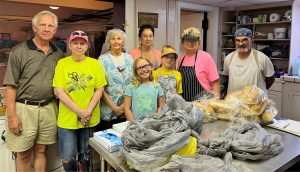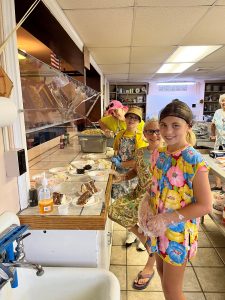
Before meal service, Frank Martin and the volunteer crew at the Community Kitchen in Masontown, PA, prep bags and containers for takeout meals.
Elizabeth Connelly, the Connections Coordinator for the Synod of the Trinity who specializes in granting, took a trip during the summer of 2022 to get a closer look at some of the outreaches that have received Synod funding. What follows is her first-person account after visiting one of the organizations that received a grant from the Synod recently.
Hospitality is a vital ingredient in our active Presbyterian faith. I can think of no other moment in many of our lives that this has been more evident, and more crucial, than during these pandemic years.
Currently, many of our communities are struggling with food insecurity at a pace so rapid that we would likely have not predicted it even five years ago. Perhaps this moves you to tears? If so, you are not alone. I am right there with you. Perhaps this has moved you to action, or to begin working with others to develop a plan for action? If so, there are folks around the Synod that are here to help and walk alongside you as you engage in the hospitality of Christ.
Earlier this month I had the great pleasure of visiting the Community Kitchen in Masontown, PA, an outreach of the First Presbyterian Church of Masontown. When I say I had the great pleasure of visiting these folks that is putting it mildly. In truth, I was humbled and remain in awe of the hospitality, nourishment and love they are providing to their community.
This ministry had been on my radar for a while, as they applied for one of the Synod’s Ecumenical Grants early in the pandemic. Upon reading the grant application, I had a hunch that the application didn’t tell the whole story, that these folks were humble servants that were doing a lot more work than they let on. So, I called Frank Martin, the organizer of the Community Kitchen who submitted the grant and a lifelong member of the First Church of Masontown. This became the first of many knowledge-imparting conversations with Frank. My hunch was correct: Masontown was feeding their community – and had been for many years – in many other ways, with true dedication and humility.
Finally, a few weeks ago, I was able to make the trip to see the Community Kitchen’s work in action. Friends, I am quick to back away when it comes to taking on the sweltering temperatures that July and August tend to impose, but these volunteers don’t back down from the scorching heat. The air conditioning at the Community Kitchen is not very effective when all the stove ranges are firing and six dedicated volunteers are bustling around and filling up pan after pan with food. Yet, each week without fail, no matter how high the heat index, this cheerful group spends most of their Tuesday prepping and cooking meals to provide to anywhere from 50 to 300 members of their community. The number of individuals served varies week to week, often due to weather and transportation issues.
Before sitting down to eat, guests and volunteers alike circle up to offer a prayer of thanks before lining up for their plates of food, taking turns weekly in leading the prayer. The volunteers that serve on the meal service line vary each week – usually two to three people from different congregations. As guests go through the line, many are familiar to volunteers. Without fail, I witnessed volunteers asking after family members, asking about health issues, job interviews or cracking inside jokes with guests as they heaped food on their plate. The serving of the roasted corn was assigned to me. Before I could even ask Joe, a guest, whether he would like a serving of corn, one of the volunteers called down the line, “Joe won’t want the corn, Elizabeth, you don’t need to ask!” Hospitality – ever the vital ingredient of every aspect of this ministry.

Young volunteers from three different congregations anxiously await to hand out the desserts at the Community Kitchen.
The meal service line is also a time when guests can request takeout meals for friends and family who were not able to attend in person due to illness or other challenges. As guests leave after their meal, their requested takeout containers are bagged up and handed to them, often with a word of encouragement. Additionally, this is the time that guests may visit the table in the back of the fellowship hall. This table made my jaw drop. The entire surface was piled high with an assortment of breads, bagels, rolls and pastries, day-old goods donated weekly by Panera Bread to the Community Kitchen.
Suffice it to say, the hospitality provided by the First Church of Masontown’s Community Kitchen is impressive. Their operation truly serves as a model to others who are looking to develop a plan to address food insecurity. This model is as good as it gets, and Frank Martin and his crew are happy to talk with you if you are seeking to develop a similar ministry. Better yet, drop in on a Tuesday and lend a hand and see for yourself Christ’s vision of hospitality in action.
So, how did they do it? Well, here are some basics to get your wheels turning.
LOCATION: First Church of Masontown is centrally located in the town and very accessible, either on foot or by car. Is your space walkable for the folks you are seeking to serve? Is your space visible enough that word will spread quickly? Is your space ADA compliant for mobility challenged guests?
EQUIPMENT: When it comes to setting up a space like the Community Kitchen, do you have the equipment you need? If not, what are some other ways that you can impact food insecurity in your community? Perhaps you go down the food pantry path, or perhaps you look at partnering with another church or organization that is already doing the work or would be willing to share their space with you. These are just a few ideas.
PARTNERSHIPS: Partnerships are often critical to the success of a service addressing food insecurity, as they can often help bolster the following:
- Numbers of volunteers – The more the merrier. Volunteers have lives, they may need to miss a few meal-providing events during the year, or they may need to drop out of their volunteer role for a personal reason. Having extra folks to help is always a good idea.
- Number of contributions – By partnering with other churches or organizations, you may benefit from their existing partnerships. You may connect with a donor who feels moved to provide monetary or in-kind support.
- Number of possible service spaces – The number of individuals you are serving may grow and you may need more space. Or, you may have an equipment failure and need to temporarily use other space in a pinch.
Your efforts will most definitely qualify for more grant opportunities if you have a variety of community partners working alongside you. For example, The First Church of Masontown partners with Panera Bread, two local Brethren churches, a Methodist church, a Mennonite church and the Catholic church across the street. These partnerships allowed them to qualify for a Synod Ecumenical Grant. They also are a distribution site for their county food bank, which gives them even more direct contact with the people that they serve and with other individuals and organizations in their county that are also addressing food insecurity.
Once you have evaluated the basics, please reach out and share what you are working toward. Walking alongside you as you move forward would be a privilege and I would love to provide you with a more detailed model and contacts of others doing this important work and send to you any financial support opportunities/applications that are available.
In the meantime, take a moment in your prayers to lift up the work and the lives impacted by the First Presbyterian Church of Masontown and other churches around our Synod serving up Christ’s hospitality through so many actions and ministries.
